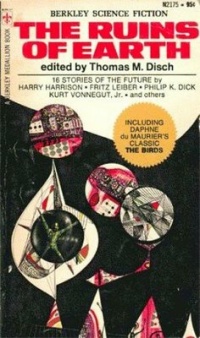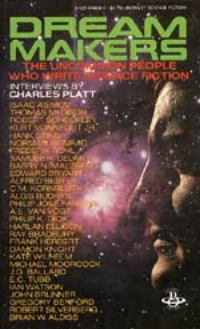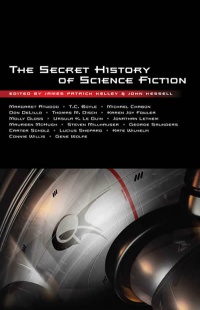While most of us listened, enraptured by the siren-songs of Technology, they [the authors included in this volume] have never ceased to warn of the reefs awaiting us on the other side of the song.
Title: The Ruins of Earth: An Anthology of Stories of the Immediate Future
Editor: Thomas M. Disch
Year: 1971
Rating: 3 out of 5 stars
 The stories in this rather dark anthology were chosen for their relevance to its central theme. That theme is the catastrophic consequences of human behavior; it is the idea that through our own stupidity, we might have a very negative impact on our world, and possibly bring ourselves to ruin. In his introductory essay, “On Saving the World,” Disch presented some of his own observations of the foreboding changes in the human world during his lifetime:
The stories in this rather dark anthology were chosen for their relevance to its central theme. That theme is the catastrophic consequences of human behavior; it is the idea that through our own stupidity, we might have a very negative impact on our world, and possibly bring ourselves to ruin. In his introductory essay, “On Saving the World,” Disch presented some of his own observations of the foreboding changes in the human world during his lifetime:
One learned to live with the bombs largely by looking the other way, by concentrating on the daytime, suburban side of existence. [….] Now, in 1971, it isn’t possible to look the other way. It is the daytime, suburban side of existence that has become our nightmare. In effect the bombs are already dropping — as more carbon monoxide pollutes the air, as mercury poisons our waters, our fish, and ourselves, and as one by one our technology extinguishes the forms of life upon which our own life on this planet depends. These are not catastrophes of the imagination — they are what’s happening.
The sixteen stories herein are largely concerned with problems such as growing separation from nature, increasing industrialization and urbanization, overpopulation, pollution, and similar issues. Disch divided the anthology into four sections: The Way It Is, Why It Is the Way It Is, How It Could Get Worse, and Unfortunate Solutions. I was sometimes unsure why a particular story was put in a certain section, but I do like the overall structure. I also like the way Disch prefaced each story with a snippet of some real-life news or journal article or other scholarly work relating to the story’s subject.
The stories included in this volume are:
“Deer in the Works” — Kurt Vonnegut Jr.
“Three Million Square Miles” — Gene Wolfe
“Closing with Nature” — Norman Rush
“The Plot to Save the World” — Michael Brownstein
“Autofac” — Philip K. Dick
“Roommate” — Harry Harrison
“Groaning Hinges of the World” — R. A. Lafferty
“Gas Mask” — James D. Houston
“Wednesday, November 15, 1967” — George Alec Effinger
“The Cage of Sand” — J. G. Ballard
“Accident Vertigo” — Kenward Elmslie
“The Birds” — Daphne du Maurier
“Do It for Mama!” — Jerrold J. Mundis
“The Dreadful Has Already Happened” — Norman Kagan
“The Shaker Revival” — Gerald Jonas
“America the Beautiful” — Fritz Leiber
As with any collection or anthology, there is quite a range of quality here. Let me mention what I consider to be the successful stories. Houston’s “Gas Mask” is about the modern phenomenon of the traffic jam, and about how far people will go for their love of those hunks of metal called automobiles. Brownstein’s “The Plot to Save the World” is a neatly efficient encapsulation of how people can’t resist the allure of “progress,” even if that progress ends up destroying them. Philip Dick’s “Autofac” (for “automated factory”) is about the disastrous consequences of turning too much power over to machines. “Do It for Mama!” by Mundis looks at urban crowding — not only crowding of people, but of pets as well. “Roommates” is the basis for Harrison’s novel Make Room, Make Room!, and is a dismal portrayal of overpopulation. Vonnegut’s “Deer in the Works” was also of interest, combining several related issues — distance from nature, out-of-control industrialization, and the displacement of ordinary human values in favor of corporate values.
Some of the remaining stories fall into a middle area of mediocrity. Some had interesting points to make, but were poorly written. Others were written with adequate skill, but lacked any point I could discern. And then, finally, a few of these stories were downright horrible; one I would even label “unreadable.”
The whole thing averages out to an average anthology, with both highs and lows of quality. But that’s how most anthologies work out, in my experience. I did like the overall theme and structure of this one, and count it as a satisfactory reading experience.
















